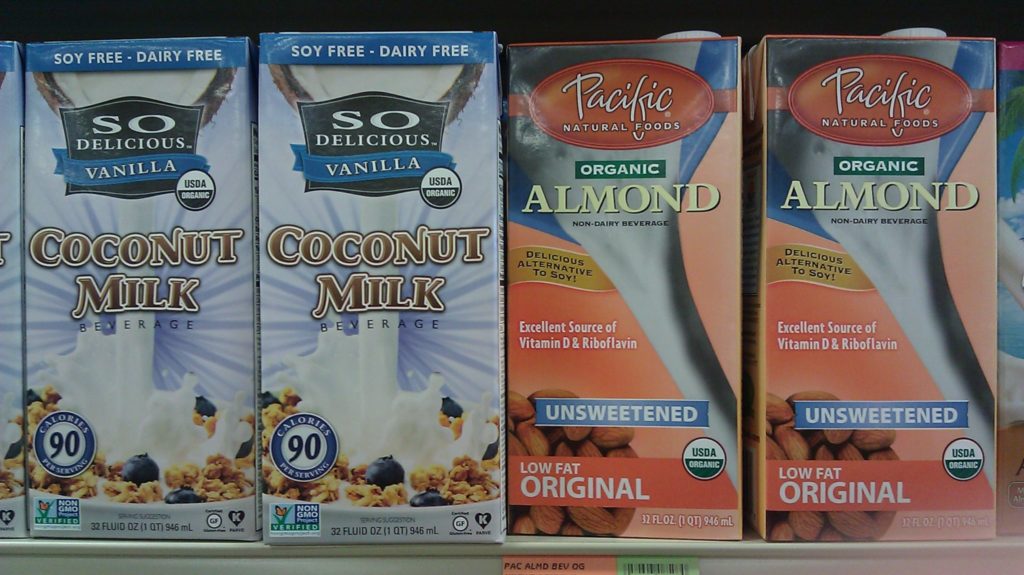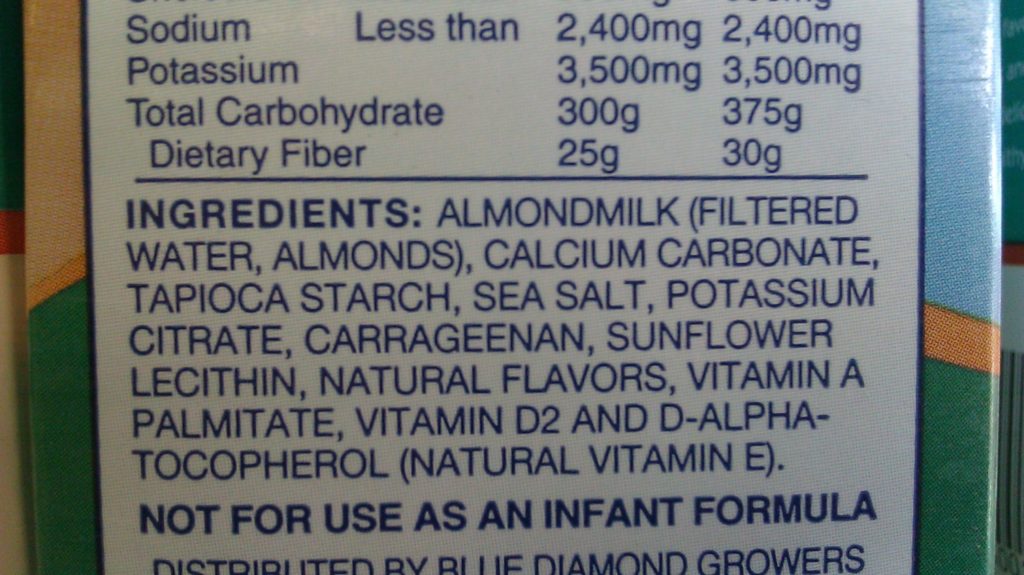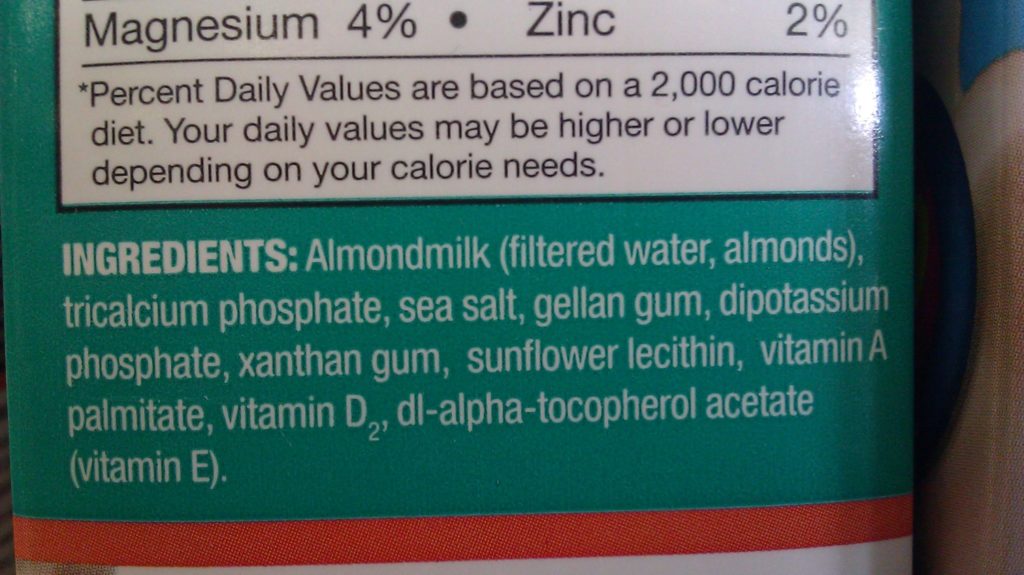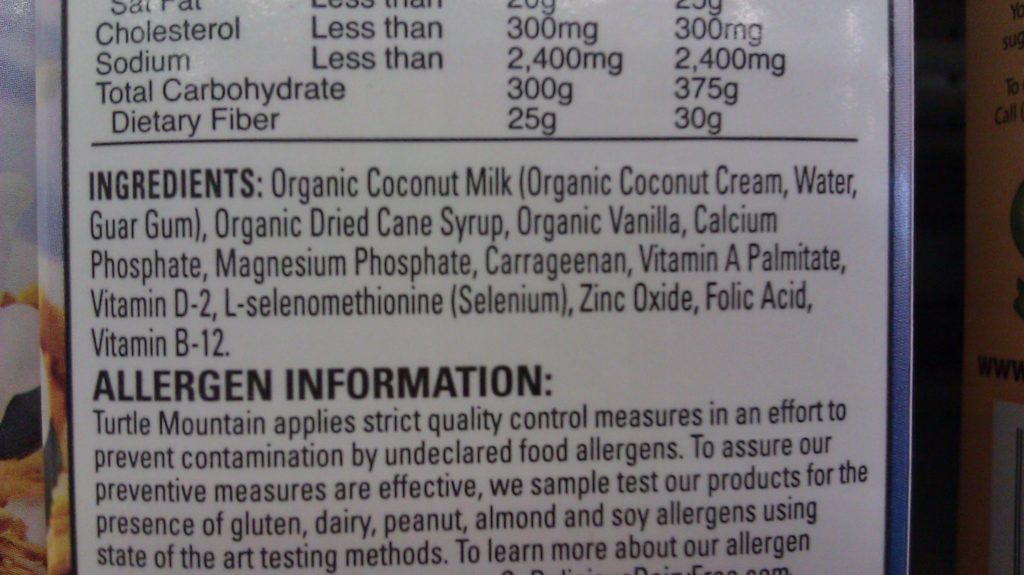 Organic coconut milk and almond milk are common purchases at the health food store by those with dairy allergies. Usually, these people are savvy consumers who know enough nutritionally to avoid soy milk with its endocrine disrupting isoflavones and gastric inflaming phytates. Rice milk is also steadily declining in popularity as it is really not much more than a glass of sugar water nutritionally speaking.
Organic coconut milk and almond milk are common purchases at the health food store by those with dairy allergies. Usually, these people are savvy consumers who know enough nutritionally to avoid soy milk with its endocrine disrupting isoflavones and gastric inflaming phytates. Rice milk is also steadily declining in popularity as it is really not much more than a glass of sugar water nutritionally speaking.
Organic, unsweetened coconut milk and almond milk in cartons seem like great alternatives at first blush, but are they really as “healthy” as people believe?
Let’s take a look at the labels. I was shocked at what I found.
Check out the labels of the three brands I photographed. I checked all the brands, by the way, and they all contained the same dangerous additives I’m about to describe.

First, Vitamin A Palmitate is added, the synthetic version of Vitamin A. I personally avoid synthetic versions of Vitamin A like the plague. Every single multi-vitamin I’ve ever examined contains some form of synthetic A, including the so called “whole foods” multis.
Synthetic vitamins are the chemical mirror images of the real, natural versions. They can cause imbalances over time. Even small amounts of the synthetic fat soluble vitamins like Vitamin A can prove toxic and should be strictly avoided!
The Organic Consumers Association warns that isolated vitamins such as those produced synthetically cannot be recognized or metabolized by the body in the same way as the natural version.

Large doses of natural vitamin A are well tolerated by the body as established by researchers decades ago, however. Traditional diets contain 10 times or more of the RDA of this nutrient with no ill effect. However, synthetic vitamin A is associated with birth defects and bone fractures. It has no benefit in the diet whatsoever.

The second really bad additive in these organic cartons of coconut milk and almond milk is Vitamin D2. Vitamin D2 is a form of the wonder vitamin that you should take great pains to avoid.
In all known cases of Vitamin D toxicity where the dose was intentional, Vitamin D2 was the culprit. By comparison, Vitamin D3 is much less toxic and requires an enormous or even an accidental dose to produce any toxic effect.
Vitamin D2 is manufactured industrially by irradiating yeast. It is dangerous for D2 to be added to any food product particularly if this product would be given to children, where toxicity symptoms would appear at much lower dosages.
None of the store brands of cartoned coconut milk or almond milk were free of these dangerous and synthetic versions of the fat soluble vitamins!
Notice also that carrageenan is present in 2 of the 3 products as well! Dr. Andrew Weil has been telling people to avoid carrageenan since 2002.
Carrageenan is so toxic and inflaming to the human digestive system that this food additive is formally classified by the International Agency for Research on Cancer (part of the World Health Organization) as a potential human carcinogen.
In my view, it would be a mistake to purchase and consume these items. They are in no way health promoting or beneficial, particularly for growing children!
Healthy Alternatives to Coconut Milk and Almond Milk in Cartons
Coconut milk and almond milk should be healthy and they can be if they are produced at home without these dangerous additives. I wrote an in depth post on how to easily make these nondairy beverages yourself. This recipe for wild rice milk is a good option as well.
Believe it or not, even organic coconut milk in BPA free cans would be a better alternative to cartons of coconut milk based on my label inspection!
Check out my video on homemade coconut milk and my article on how to make healthy DIY almond milk, fermented to add probiotics and enzymes to boost immunity and improve digestion.
Sarah, The Healthy Home Economist
Sources
From Seafood to Sunshine: A New Understanding of Vitamin D Safety








Thanks so much for this information. I am a bit dubious that the cans of coconut milk sold on amazon.com are truly BPA free…but I may try those out and just dilute that milk in water. I just found out the other day that carageenan and guar gum are, essentially, MSG, and I am really upset about it…not that I drink a lot of almond milk, but it is my go-to drink, particularly when I make hemp protein shakes. Thanks for the Vitamin D2 info as well. You’ve upset the vegans on here…I’m vegetarian who is trying to convert to veganism, and I was unaware that there was no viable plant-based Vitamin A source…but i will search for a supplement, because I just can’t do something that is cruel and bad for the environment, even if i tried. There must be another way, I’m sure. Thanks again.
Try roasted seaweed(sushi sheets).You get 20%DV of vitamin A per sheet.
thanks for that info! i love seaweed. 🙂
I been drinking it anyway.I’m not a vegetarian.I just never liked milk that much.I got silk brand for awhile.Got a couple “organic” so delicious brands yesterday.Synthetics in USDA organic,doesn’t surprise me really.I went to all local stores & couldn’t find anything better.None carry organic coconuts or any type of organic nuts.I bet they are dipped in fluoride anyway.
The only carton of any type of organic milk here, is the one that sais organic on the label of ingredients shown. This is way misleading. She is referring to “organic” almond milk, while showing almond breeze, non-organic. From this report we have no idea what is in organic almond milk; as Blue Diamond Almond Breeze Almond milk is not organic at all.
Lauren,
You are absolutely right about this lady’s intentions. She sounds knowledgeable, but may have issues with self worth. Did you check her statement about BPA cans? Lol! She said she’d rather people drink out of BPA FREE cans than drink products that are obviously taking advantage of the whole foods process. Her suggestions are ludicrous and remind me of someone with munchausen by proxy syndrome, only on a grander scale. In her case, making the world sick so she can feel ‘gratified’ she healed them. So for those of you who do not know there are actual whole food products you can purchase that are truly organic. Check your local Asian, African or Middle Eastern store aisle for ‘true’ products which you don’t have to make yourself! Do be careful as even a few of these have guar gum/xantham gum as an additive. Get the product that has one ingredient: Coconut Milk! So you see unfortunately this overindulged Internet hog, doesn’t know everything. That’s why a community of information sharing will always be better than one person who wants alllllllll the glory….tsk, tsk (shaking my head)! My son has some severe issues, one being asthma of an incredible oxygen robbing manifestation. After learning bout coconut water and other pure, non-refined coconut products such as coconut milk, cream (just add water to make it milk), vinegar, sugar, etc. we’ve seen a steady improvement in his health and social skills (when one is oxygen deprived your communication skills go down the drain as who can learn to talk when you can’t breath so you use your hands wildly and this learned behavior doesn’t leave once the gift of air is given. So imagine what it must be like for him at school)! This lady has a lot to learn about ethics and research. She is truly just taking advantage of weakened minds and desperate attitudes. If one truly cares about one’s health, do whatever research necessary to validate her claims! There is too much information on the Internet of RELIABLE source to counteract her unjustified, confused and poorly written diatribe! Please do your research and yes, READ THE LABELS COMPLETELY!
H. Nicole Lea Mon
Naturopathic Therapist
An excellent post. It’s unfortunate that a product that markets itself as being a healthy alternative contains so many unnecessary synthetic components. I’ll definitely look in to finding ways to consume coconut milk without the additives, because I do find it to be an excellent tasting beverage and great substitute for milk taste-wise.
I just came across this post and find it very interesting. For a time, when he was around 14 months old, I gave my son Almond milk from the carton as we were weaning him off formula. Shortly after he began developing dry skin/dermatitis that I was sure was linked to the Almond milk (we have hereditary skin issues and sensitivities to dairy). It immediately cleared up when we stopped with the Almond milk and returned to formula. He did better on formula to be honest. I’m not a fan of formula, but I couldn’t breastfeed past 8 months and we didn’t have access to raw milk. I am sure it had to do with the denatured product as well as the additives. This post has been very eye opening and I will be doing additional personal research on vitamins and additives in all products we eat.
I don’t know this site and I am going to look at it more when I have the time. I am concerned about some of the opinions of intolerance as well as “advice” being dispensed. Every person is different, and while certain things are clearly less advisable and unhealthy, it is a dangerous policy to make a blanket statement of advice regarding something like vitamins, etc. Different medical situations, genetics, nutritional profile through childhood and beyond, and economic circumstances all determine whether someone may need supplementation. The same goes with being well-suited to a vegetarian/vegan diet (or it to them). I would hope that the intent of this site is to raise awareness and discussion rather than alienate. There are good brands of products out there which the author and respondents have done a great job of identifying (thank you!). And hopefully every person listens to their bodies and instincts to determine what is best for them and their families.
Final note…Tremendous contributions have been made by the vegetarian and vegan communities in regard to nutritional information, cookbooks & recipes, etc. Although I am neither, I own a number of books written from that perspective. I find the raw food emphasis particularly useful for reminding myself to have a green smoothie or a bowl of fruit instead of a piece of buttered toast and a cheese stick just because it’s easy (I have dairy intolerance), and where I heard about almond milk in the first place. The well-known vegan, raw food advocate and author, Shazzie, spent a number of years researching children’s nutrition after her daughter was born. The result is one of the best nutrition books, especially for children, I have ever read (Evie’s Kitchen)–also chock-full of recipes that are highly nutritious and will appeal to children. The publication of her book created tremendous controversy within that community by stating she had never seen a truly healthy, unsupplemented raw vegan child. She takes great care as a vegan to make sure she gets all the nutrition she needs and knows where to go for the sources, but was willing to question her beliefs rather than impose them, for the sake of her child’s health and well-being. There are so many nutritional lifestyles, and we all have things we can learn from one another–I hate to see a group denigrated and reader’s alienated when they could benefit from the comments here, and reader’s could also benefit from what they bring to the table. Undoubtedly, we all have more in common than not in our desire to feed ourselves and our families more whole and nutritious foods and live harmoniously on the planet.
I just came across your article and upon doing a little research found a coconut water/milk/cream distributor that seems to not have any of the bad things you mentioned. They seem reasonable and I an happy to support their business.
http://www.wildernessfamilynaturals.com
PS I’m in no way affiliated with them, just found them when searching for high quality coconut products.
Thank you for the info!
Get a life.
You know what I’m tempted to call claims about vitamins that are nowhere near conclusively substantiated by medical science? Lies. Ya know – the kind that get ratings/readers. I suppose if you’re just too stupid to know better, though, we would just call it confusion.
Thank you, Sarah – I’m curious of your opinion of this multi which I’ve heard a lot of good things about:
http://www.irwinnaturals.com/products/mens-formulas/mens-living-green-liquid-gel-multi/
Thanks!